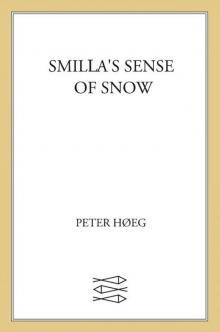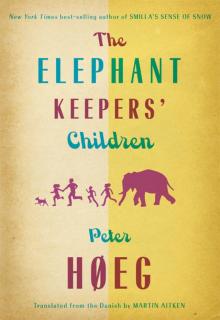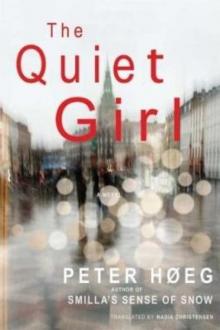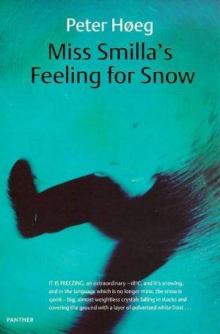- Home
- Peter Høeg
The Woman and the Ape Page 19
The Woman and the Ape Read online
Page 19
The man stopped rocking. Now he stood stock-still, looking at the ape.
The doorbell rang. No one moved. The door opened and Alexander Bowen walked in. Wearing his white coat and carrying a small leather bag.
Dazzled by the sunlight in the street, all he could make out in the hall were the owner of the house and the maid.
“Where is it?” he asked.
The man motioned toward Erasmus. The doctor moved a little closer, then stopped short.
“We’re so pleased to see you again,” said Madelene from the shadows.
She and Erasmus positioned themselves one on either side of the doctor and escorted him to the door. The owner of the house took a couple of hesitant steps after them, caught up in an overwhelming moment of déjà vu.
In the doorway the ape doffed its felt hat and bowed to the maid. The man stared at the white down covering its cranium.
“Many thanks for the shelter and refreshment,” it said. “Both to you and your husband.”
four
The ambulance was parked twenty-five yards away. They got into the back. Up front, on the other side of the Plexiglas partition, sat two porters. It was Madelene who slid back the partition but it was Priscilla who gave the order.
“Drive around the corner and pull in to the curb.”
The doctor’s eyes had not left Erasmus.
“It’s true, then,” he said. “It does talk.”
The ambulance drove around the corner and stopped. The doctor was still staring at Erasmus.
“You’re going to be rolling in it,” he told Madelene. “I hope it’s got a good agent. And a good accountant.”
Hysteria drew a snigger from him.
“Its first tax return is going to be a farce. There’s no law governing the income of apes.”
Madelene poked a banknote through the partition.
“You’ve got the rest of the day off,” she said. “Take a taxi home. And buy your wives some flowers on the way.”
The two men got out. Madelene drew the ambulance’s gray curtains. She opened the leather briefcase the doctor had brought with him. Nestling in blue velvet lay an air gun, a hypodermic syringe and two glass ampules, one of them filled with a pink liquid.
“Sleep-away,” said Madelene. “Sodium pentobarbital. Adam says it homes straight in on the central nervous system. Two seconds and you’re dead.”
In the ambulance all was silent.
“I could cry out for help,” the doctor said.
Madelene did not answer.
“I suppose it’s those results you’re interested in. They’re from the DNA laboratory. At the Institute for Population Biology. The best in the business. They’re the ones who backcrossed Przewalski’s horse. DNA sequencing. That’s what it’s called. They set pseudogenes side by side. Then they can see the number of phenotypically neutral differences. These differences go to make up a molecular clock from which they can tell the length of time between two species. How long ago they broke away from one another. It’s by means of this method that they’ve been able to show exactly how close we come to chimpanzees. Six million years. Give or take a million.”
He paused, a market trader’s tactical pause.
“What do I get for telling you all this?”
It was the ape who answered.
“The best we can do for you,” it said quietly, “is to allow you to go on living.”
Thoughtfully Madelene noted this fresh expression of her lover’s characteristic candor. The ape had not made a threat, since a threat is all part of a game and the ape possessed none of the strategist’s craft. It had stated a lethal fact.
The vet had gone white around the gills. He looked at Madelene, at the ape, and reassessed his position. Then he gave up.
“The first time I saw it—I’m sorry, I mean you—I thought to myself, it’s some new species of chimpanzee, that’s what we all thought, Burden and his sister too. A sensational new type of chimpanzee. From a temperate zone. That’s what we took as our starting point. That’s what we told the molecular taxonomists. Of course, we didn’t show them any pictures. All they were given were the cell samples. They sequenced thirty thousand genes. It must have cost Miss Burden a fortune. But we had it wrong. It—I’m sorry, you—were not close to the chimpanzee. It came close, horrifyingly close to—was impossible to tell apart from—ourselves. It—I beg your pardon, you—are, at least in genetic terms, not so much an ape as a human being.”
Madelene gazed around. She saw the gray light on the built-in cots, the oxygen cylinders, the instrument drawers, the bags and the tubes for blood transfusions. She looked at what the doctor had said and she looked at the doctor himself, at the triumph with which he was regarding them. She opened her mouth to say something nasty, but the ape stopped her.
“We are very grateful to you,” it said steadily. “And we take the liberty of asking you to do us one more small favor—to drive us to Mr. Bally.”
“I don’t have my driver’s license on me,” said the doctor. “I haven’t been behind the wheel in ten years. And I’ve never heard of anyone by that name.”
Gently Madelene and Priscilla lifted the pink ampule free of the blue velvet.
“Oh, but you have to,” she said. “Otherwise I’ll need to ask you to swallow this.”
five
The man who had some months previously been calling himself Bally was, at this particular moment, doing quite nicely, thank you. After having been fished out of the Thames by the London Port Authority, after having been identified and then put in solitary for three weeks, he had received a visit from Andrea Burden, had been released and had The Ark—with a market value of half a million pounds—plus another quarter of a million pounds’ worth of veterinary equipment, returned to him. In three days’ time, once he had given his testimony—under the immunity granted to him—he would set sail from London, on course for an objective which, for the first time in a good many years, was not primarily money-oriented and which filled him with a hopefulness he had not known he possessed: Bally had made up his mind to catch another ape like the one that had given him the slip. Not in order to sell it, but to sit once more across from it in the cramped confines of the cockpit, to once more encounter something like Erasmus.
In recent months he had returned again and again in his thoughts to his last few minutes with the ape and it was on this memory that he was reflecting, leaning on the boom that had swept him overboard, when an ambulance from the Holland Park Veterinary Clinic drove out onto the wharf and drew to a halt.
A woman in a blue lab coat got out and walked over to the boat.
Making no other move to speak of, Bally slipped his hand down through the hatch and released the two catches around a shotgun, the barrel of which had been sawn off just above the head of the stock. Not that there was anything menacing about the woman as such, but Bally had not been expecting her, and it was just this insouciantly cautious approach to the unexpected that had made him a prince in the hazardous international principality of those who made their living by breaking the Washington Convention.
“Mr. Bally,” said the woman. “Dr. Bowen is over there in the van.”
Bally nodded politely. Then he stepped onto the quayside and followed her, the shotgun hanging down at his side like a gleaming rolled umbrella.
A man, also wearing a blue lab coat, opened the back door of the ambulance. Looking past him at the driver’s seat, Bally recognized Alexander Bowen. He ducked his head to climb inside.
“Excuse me,” said Erasmus, pointing at his weapon. “Would it be too much to ask you to leave that outside?”
Bally looked at Erasmus. He sensed the danger but could not figure out from whence it came.
With an obliging smile he bent down and propped the gun up against the pressurized cylinders in the ambulance. Then he kicked Erasmus.
There are not many people who can boast of having kicked the legs out from under a berserk fifteen-hundred-pound rhino calf on the rampage but
Bally could. He caught the outer edge of the ape’s right kneecap; the leg gave way and Erasmus dropped to his knees, never uttering a sound.
Then Bally aimed a kick at the ape’s head.
His first kick had been first-rate, but it had been delivered with the left leg and this was Bally’s weak side. The second was made with the right; it was all one could have asked for and it wrenched the vehicle’s bumper free of its bodywork. But it did not make contact with Erasmus because Erasmus had suddenly—and, to Bally, quite unaccountably—dodged a foot and a half to one side.
Keeping his eyes pinned on the ape, Bally lifted his gun from where he had left it. But he had no chance to use it. He had no chance even to cock it. Just as he was about to draw himself up Erasmus hit him.
It was a wild blow with the flat of the hand, and had it been dealt by a human being, it would have amounted to a casual clip around the ear. But it was not dealt by a human being. It struck Bally with all the force of a pneumatic hammer, produced a crack like a pistol shot, lifted him off his feet and hurled him up against the ambulance door.
At this point he momentarily lost consciousness and, left unsupported, he would have collapsed. But the ape supported him. Its left hand shot out, grabbed him by the jaw and held him upright.
But it also cut off his air supply and it was the feeling of being suffocated that brought Bally around. He opened his eyes, and looked along the length of the arm at the ape’s face bearing down on him. When Erasmus was about as close as he could get, a bare inch away from Bally’s jugular, he drew his lips back and opened his mouth. Bally felt the ape’s breath, the heat of its throat, saw its glittering, conical two-inch-long canines.
“Erasmus!” said Madelene.
Erasmus released his grip. Bally crumpled into a heap on the ground.
Alexander Bowen had flattened himself against the dashboard.
“I’m holding you responsible,” he said. “You’re going to reimburse me. For any and all damage to the vehicle and/or equipment.”
The ape deposited Bally on a cot. Madelene lifted the receiver of the ambulance telephone.
six
Half an hour later there was a knock on the ambulance’s rear door. Erasmus opened up and Johnny climbed in, dragging a trembling Samson with him. He glanced at Bally, then sat down.
A quarter of an hour went by without a word being said. Then came another knock. Erasmus let in Dr. Firkin, the veterinary odontologist. Five minutes later there was yet another knock.
“There is a limit,” said Dr. Bowen, “to the number of passengers this vehicle is authorized to carry. If it comes to a fine…”
Erasmus opened the door. Outside stood Susan.
“I had to bring the children along,” she said.
Confinement within a small space heightens and accentuates all human relationships. The ambulance now contained ten individuals—six adults, two children, a dog and an ape. They had come because they had been forced or because Madelene had asked them to, and without knowing why. Now they looked at her, feeling giddy, like passengers on a ship that is too small, steering an uncertain course onto the high seas.
“The day after tomorrow,” said Madelene, “Adam becomes director of London’s new zoo. At the ceremony he’s going to make a speech, revealing everything he knows about Erasmus. I’ve been married to Adam. I know that if you try to learn too much too fast, in his way, you wipe out whatever it was you wanted to learn about. I have been wondering whether those of us who are gathered here might not be able to persuade him not to say anything after all.”
She had spoken softly but they listened; they heard every word. The children had forgotten the dog, the dog had forgotten the ape, Bally had forgotten his bruises, Johnny had forgotten his withdrawal symptoms.
“I thought we could give him a call. Now. And then we could each say something to him, just a few words. So he knows that we have joined forces, that our knowledge has been pooled, and that if he proceeds he is going to founder, his life will go under.”
She lifted the receiver.
* * *
Adam Burden’s secretary had had two months in which to forget, to recover, but as soon as she recognized that low, husky and penetrating voice on the telephone, she realized that while she might well be on the mend she was anything but cured.
“He’s out of town,” she said. “No one knows where he is. He has gone away with his sister. They’re getting ready for the ceremony two days from now. I don’t see what I can do…”
Madelene stood where she was, unmoving, with the receiver pressed to her ear. She did not try to argue, she knew the woman was speaking the truth.
“What about the day after tomorrow, before the ceremony?”
“He’s going straight there. They’ll be checking everyone at the door. And only two hundred personal invitations have been sent out. But I could fix up something after that…”
The secretary’s voice had grown tearful.
“After that,” said Madelene, “it will be too late.”
She put down the receiver.
They were all watching her. She could sense their instability. And all at once it occurred to her that she must have been mad to pin her hopes on such a crew. What were they, after all, but children, dogs, quacks, smugglers and addicts. Losers, all of them, and she, the one who had collected this human flotsam and jetsam, was the biggest loser of them all. She sat down.
The ape placed a hand on her thigh. A dry, warm and totally steady hand. She relaxed, they all relaxed. The ape’s steadiness coiled itself around them; like the onset of a fair wind, their wait proved suddenly fertile.
It was Susan who eventually broke the silence.
“My God!” she said. “Of course! Frank and I are invited. I have two invitations. And we can rustle up a couple more.”
Madelene stared at her friend.
“You go in my place,” said Susan. “And Johnny will go. And the man who’s all battered and bruised. And when Adam sees you … I know him, I know all about men, Adam’s cautious, if you gave him an apple he wouldn’t bite into it until he’d had it tested in the laboratory … when he sees you…”
Everyone looked at Madelene. All his life Adam Burden had been a mystery to everyone around him. Madelene had been married to this mystery. Now they wanted her to solve it.
She gazed into space.
“I don’t think,” she said, “Adam has ever truly had any interest in animals. They were more … a sort of underpinning for him. When he sees me and Johnny and Bally there in the audience, he’ll realize that now it’s purely a matter of staying afloat.”
They all sat there quietly, listening, rapt, like the crew of a vessel heading out of the doldrums. The ambulance was starting to pitch and roll. The wind had risen.
* * *
Madelene walked her friend and the two children to their car.
“So what was Adam actually heading for?” asked Susan. “By way of the animals, I mean.”
“Sometimes I think it was me.”
“And now?”
Madelene stared straight ahead with that expression of dearly paid-for lucidity accorded only to those who have staked their existence on another human being, lost everything and discovered that there is life to be found even on the other side of the great crash.
“That’s a question he would always have been too busy to ask himself.”
Susan helped the children into the car.
“What if their father asks where they’ve been?” Madelene asked.
Susan straightened up and scratched her head. Over the past twenty-four hours her scalp had begun to itch.
“D’you know what?” she said. “That’s a question their father would always be too busy to ask.”
* * *
Erasmus escorted Bally back to the boat, assisted him into the cockpit and climbed in after him.
“When,” asked the ape, “is Mr. Burden making his speech?”
“Day after tomorrow. Friday.”
> “How many times do we have to sleep before it’s Friday?”
“Two,” said Bally.
“Do you happen to know where he will make this speech?”
Bally avoided looking the ape in the eye. He knew it did not waste time on irony. He stuck a hand through the hatch, took a telephone directory from the shelf under the guy, wrote the telephone number and address of the London Zoo on a slip of paper and pushed it across to the ape.
It did not touch it.
“In that book, can you also see where people live?”
Bally nodded.
“Could I trouble you to look for someone for me?”
Slowly, deliberately, it pronounced the first name for Bally.
Not until there were twelve addresses and telephone numbers on the sheet of paper did the ape pick it up without looking at it, fold it and tuck it carefully away in a pocket. Then it stood up. In its hand it was still holding the sawed-off shotgun. It raised it to eye level.
“Where I come from,” it said, “we usually give one another presents. When we … understand one another.”
It wrapped both hands around the gun. The muscles around its wrists flexed. With a series of muffled cracks, of bolts snapping, varnished wood splintering and clips being torn apart it bent the two cylindrical barrel stumps around to meet the neck of the butt. This done, it set the mangled weapon down on the seat.
“I would most earnestly request that you not tell anyone about our being here,” it said. “And that you take care that nothing befalls Mrs. Burden on Friday. After we have slept two times.”
* * *
The ape found the ambulance empty apart from Alexander Bowen.
“I’ll be missed soon,” said the vet. “They’ll be looking for me.”
The ape sat down.
“No one will miss you,” it said. “You have no friends.”
The doctor’s unfailingly en garde expression gave way to a stunned stare. The ape’s clairvoyant candor affected him more deeply than any threat.
“It’s true,” he said. “Not a single one. Isn’t that terrible?”

 The Woman and the Ape
The Woman and the Ape Smilla's Sense of Snow
Smilla's Sense of Snow Borderliners
Borderliners The Susan Effect
The Susan Effect The History of Danish Dreams
The History of Danish Dreams The Elephant Keepers' Children
The Elephant Keepers' Children The Quiet Girl - Peter Hoeg
The Quiet Girl - Peter Hoeg Smilla's Sense of Snow aka Miss Smilla's Feeling for Snow
Smilla's Sense of Snow aka Miss Smilla's Feeling for Snow